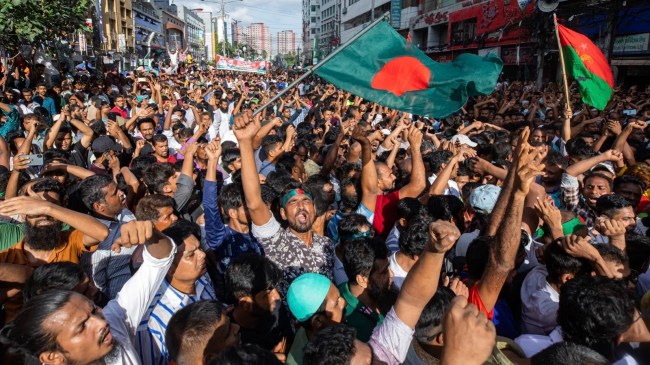Opinion Ram Madhav writes: Bangladesh, a year later
Ahead of elections next year, political space in the country is open for fresh players
 With the AL banned, the political space in Bangladesh remains open for new players in the coming elections. While the BNP remains the main contender, the rise of others, including the Jamaat, cannot be ruled out.
With the AL banned, the political space in Bangladesh remains open for new players in the coming elections. While the BNP remains the main contender, the rise of others, including the Jamaat, cannot be ruled out. Reports in the Bangladesh media state that Muhammad Yunus, the chief adviser to the government, indicated recently that parliamentary elections will take place in February next year. August 5 marks one year since the ouster of an elected government led by Sheikh Hasina. Weeks of protests led by students and youth in July last year culminated in the Hasina government’s collapse. She was forced to flee the country on August 5. Ever since, she has been in exile while Bangladesh has been administered by Yunus, with the help of a group of student leaders and former bureaucrats.
What began as an interim arrangement is likely to continue until a new democratically elected government is put in place. While the installation of this non-elected arrangement in a country of 175 million people can rightly or wrongly be attributed to some outside authority, its continuance without much resistance for more than a year needs to be understood. Politics in Bangladesh was dominated for five decades by two major parties — the Awami League (AL) led by Sheikh Hasina, and the Bangladesh Nationalist Party (BNP) led by Khaleda Zia. Both parties have a dominant presence not only in the political arena but also among students, youth, women, farmers and factory workers through various party wings. The question is: How has Yunus’s administration continued to govern without any major challenge from the supporters of these two parties, which have ruled the country without interruption in the last three decades? In a country where massive street protests are not uncommon, why have these two parties been unable to mobilise any resistance to the unelected regime and to push for early elections? Therein lies an important message for India and the world.
The immediate trigger for the protests against the Hasina government was its decision to reserve 30 per cent of government jobs for children of “freedom fighters”. In a country with a massive youth population and relatively high unemployment rates, this decision, which took the total reservation to 56 per cent, was bound to create unrest. In fact, bowing to a similar student agitation in 2018, the Hasina government had revoked the move for the same 30 per cent quota. At the time, many saw the policy as a means to fill government posts with AL supporters. The matter returned to haunt her again through a Bangladesh High Court ruling annulling her 2018 decision and reinstating the quota.
As an astute politician, having experienced the mood of the people on that issue six years before the protests last year, Hasina should have found better ways of dealing with the court ruling and adopted conciliatory measures. Sadly, when protests broke out at the country’s public universities in Dhaka, Rajshahi, Jahangirnagar and Chittagong, Hasina decided to respond with force.
The worst provocation came on July 14 when she allegedly commented at a press conference that “if the grandchildren of freedom fighters do not receive benefits, should the grandchildren of Razakars receive them instead?” In Bangladesh, people who collaborated with Pakistan at the time of its freedom struggle are called Razakars. Equating the entire agitating student community with Razakars was an avoidable mistake. Hasina’s statement brought an important twist to the agitation. Not only did the agitation spread to private universities, but it also brought students of madrasas into it. Rough estimates put the number of madrasa students in Bangladesh at around three million. This marked an important dimension of the student movement — the entry of the Jamaat-e-Islami Bangladesh.
Jamaat and the AL have had a chequered relationship throughout. Bangabandhu Mujibur Rahman viewed the Jamaat as a collaborator during the freedom movement and banned it in 1972. General Ziaur Rehman, who succeeded Bangabandhu through a coup in 1975, lifted the ban, and Jamaat became a partner of the BNP in later decades, even joining the coalition government in 2001. After the Hasina government came to power in 2009, it went after the Jamaat leadership and prosecuted a number of its leaders for war crimes during the freedom struggle. The country’s Supreme Court had cancelled the Jamaat’s registration as a political party in 2013. Dormant since then, the Jamaat found an opportunity to return in strength through the largely apolitical student movement. The Hasina government banned it again on August 1, 2024, but this did not have much effect.
Two forces that have sustained the Yunus administration are the students and the Jamaat. Whenever elections are held, it is these two forces that will play a crucial role. The Yunus administration banned the AL in May this year using a “fact-finding report” by the UN Human Rights Commissioner’s office on “violations and abuses related to the protests of July and August 2024 in Bangladesh”. The report’s findings, widely published in Bangladesh, were a damning indictment of Hasina’s regime. It alleged that upwards of 1,400 civilians, a large number of whom were students, were killed during the protests at the hands not only of the Bangladesh police but also the youth and student wings of the AL.
With the AL banned, the political space in Bangladesh remains open for new players in the coming elections. While the BNP remains the main contender, the rise of others, including the Jamaat, cannot be ruled out. Contemporary politics in South Asia is largely youth-led, and we have seen the decline of traditional parties and the rise of new ones that offered fresh hope in countries like Sri Lanka and Pakistan.
India is the only successful democracy in the region and an inspiration to all its neighbours. It always acted not as a Big Brother trying to pick and choose leaders in the neighbourhood but as an elder brother trying to help strengthen democratic systems. As Bangladesh prepares for its elections, India’s role cannot be anything more than that.
The writer, president, India Foundation, is with the BJP. Views are personal






